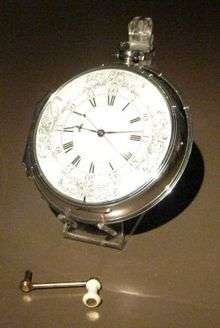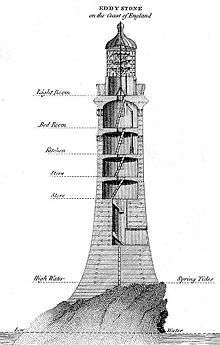1759 in science
The year 1759 in science and technology involved several significant events.
| |||
|---|---|---|---|
|
Astronomy
- Halley's comet returns; a team of three mathematicians, Alexis Clairaut, Jérome Lalande and Nicole Reine Lepaute, had—for the first time—predicted the date.
Biology
- Caspar Friedrich Wolff's dissertation at the University of Halle Theoria Generationis supports the theory of epigenesis.[1]
Botany
- Kew Gardens established in England by Augusta of Saxe-Coburg, the mother of George III.[2]
Geology
- Giovanni Arduino proposes dividing the geological history of Earth into four periods: Primitive, Secondary, Tertiary and Volcanic, or Quaternary.[3]
Physics
- Posthumous publication of Émilie du Châtelet's French translation and commentary on Newton's Principia, Principes mathématiques de la philosophie naturelle.
Medicine
- Angélique du Coudray publishes Abrégé de l'art des accouchements ("The Art of Obstetrics").
Technology
- English clockmaker John Harrison produces his "No. 1 sea watch" ("H4"), the first successful marine chronometer.[4]
Transport
- James Brindley is engaged by the Duke of Bridgewater to construct a canal to transport coal to Manchester from the duke's mines at Worsley, in North West England.
- October 16 – Smeaton's Tower, John Smeaton's Eddystone Lighthouse off the coast of South West England, is first illuminated.[5]
Awards
Births
- December 2 – James Edward Smith, English botanist (died 1828)
- Date unknown – Maria Pettracini, Italian anatomist and physician (died 1791)
Deaths
- February 16 – Bartholomew Mosse, Irish surgeon (born 1712)
- September 10 – Ferdinand Konščak, Croatian explorer (born 1703)
gollark: osmarks.tk potatoS minoteaur bees bees BEES
gollark: esolangs
gollark: esolangs
gollark: esolangs
gollark: I Finally submitted my moderator application. I should be moderator within the next few hours.
References
- Petrunkevitch, Alexander (June 1920). "Russia's Contribution to Science". Transactions of the Connecticut Academy of Arts and Sciences. New Haven. 23: 235.
- "Royal Botanic Gardens, Kew". World Heritage. UNESCO. Archived from the original on 17 August 2010. Retrieved 2010-07-04.
- Bates, Marston (1950). The Nature of Natural History. New York: Charles Scribner's Sons. p. 51.
- Royal Observatory Greenwich souvenir guide. 2012. pp. 34–35. ISBN 978-1-906367-51-0.
the first precision watch and considered by many today as the most important timekeeper ever.
- "Eddystone Lighthouse". Trinity House. Archived from the original on 9 September 2006. Retrieved 2006-09-06.
- "Copley Medal | British scientific award". Encyclopedia Britannica. Retrieved 21 July 2020.
This article is issued from Wikipedia. The text is licensed under Creative Commons - Attribution - Sharealike. Additional terms may apply for the media files.

